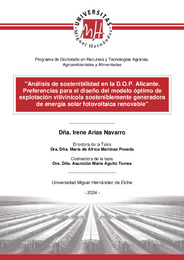Título :
Análisis de sostenibilidad en la D.O.P. Alicante. Preferencias para el diseño del modelo óptimo de explotación vitivinícola sosteniblemente generadora de energía solar fotovoltaica renovable |
Autor :
Arias-Navarro, Irene  |
Tutor:
Martinez-Poveda, Africa 
Agulló Torres, Asunción María  |
Editor :
Universidad Miguel Hernández |
Departamento:
Departamentos de la UMH::Economía Agroambiental,Ing. Cartográfica y Expresión Gráfica en la Ingeniería |
Fecha de publicación:
2024-12-19 |
URI :
https://hdl.handle.net/11000/36503 |
Resumen :
La sostenibilidad medioambiental es un activo fundamental en el desarrollo de todas las políticas agrarias de la Unión Europea. Sin embargo, su aplicación práctica está encontrando importantes incompatibilidades entre varios de sus objetivos, como la preservación del paisaje y la actuación contra el cambio climático, a través de la explotación de sistemas de energías renovables. España y su viticultura bajo DOP se enfrentan a un dilema exponencial: el cambio de uso de las tierras agrícolas productoras de uva de vinificación, para instalar paneles solares de generación de energía renovable, en un contexto de permanente incertidumbre y falta de relevo generacional. Este estudio considera los factores que han influido en la evolución del uso del suelo para generadora de energía solar, socialmente aceptado. Como conciliación al dilema y en viñedo en la provincia de Alicante y la ocupación actual del territorio por instalaciones fotovoltaicas, buscando indagar sobre el posicionamiento de la sociedad ante este dilema, y analizar los principales factores que trascienden a sus preferencias. Mediante técnicas de investigación anónimas, se identifican los elementos que determinan un diseño óptimo de explotación vitivinícola consonancia con la Agenda 2030, se propone un modelo agrovoltaico que salvaguarde el paisaje vitivinícola y su patrimonio, y promueva el desarrollo económico de su territorio, para ser considerado en futuras autorizaciones de instalaciones fotovoltaicas en la DOP Alicante
Environmental sustainability is a fundamental asset in the development of all agricultural policies of the European Union. However, ist practical application is encountering significant incompatibilities among several of its objectives, such as landscape preservation and action against climate change, thorugh the exploitation of renewable energy systems. Spain and its viticulture under DOP face an exponential dilemma: the change in use of agricultural lands producing wine grapes, to install solar panels for renewable energy generation, in a context of permanent uncertainty and lack of generational turnover. This research considers the factors that have influenced the evolution of land use for vineyards in the province of Alicante and the current occupation of the territory by photovoltaic installations, seeking to investigate the positioning of society before this dilemma, and analyse the main factors that transcend their preferences. Through anonymous inquiry techniques, the elements that determine an optimal design of viticulture explotation generating solar energy, socially accepted, are identified. As a conciliation to the dilemma and in line with the 2030 Agenda, an "agrovoltaic" model is proposed that safeguards the viticultural landscape and its heritage, and promotes the economic development of its territory, to be considered in future authorizations of photovoltaic installations in the DOP Alicante
|
Notas:
Programa de Doctorado en Recursos y Tecnologías Agrarias, Agroambientales y Alimentarias |
Palabras clave/Materias:
Energías revnovables
Energía solar fotovoltaica
Instalación fotovoltaica
Explotación vitivinícola
Sostenibilidad medioambiental |
Tipo de documento :
info:eu-repo/semantics/doctoralThesis |
Derechos de acceso:
info:eu-repo/semantics/openAccess
Attribution-NonCommercial-NoDerivatives 4.0 Internacional |
Aparece en las colecciones:
Tesis doctorales - Ciencias e Ingenierías
|
 La licencia se describe como: Atribución-NonComercial-NoDerivada 4.0 Internacional.
La licencia se describe como: Atribución-NonComercial-NoDerivada 4.0 Internacional.
.png)
